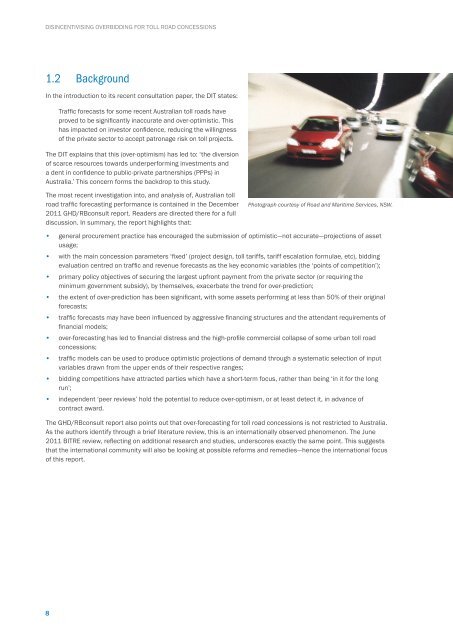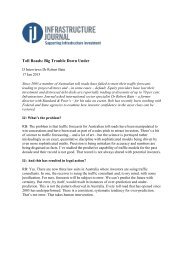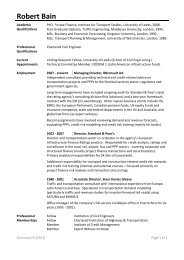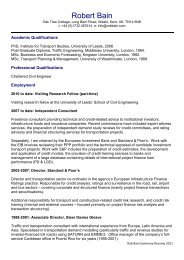Disincentivising overbidding for toll road concessions
Disincentivising overbidding for toll road concessions
Disincentivising overbidding for toll road concessions
- No tags were found...
You also want an ePaper? Increase the reach of your titles
YUMPU automatically turns print PDFs into web optimized ePapers that Google loves.
DISINCENTIVISING OVERBIDDING FOR TOLL ROAD CONCESSIONS<br />
1.2 Background<br />
In the introduction to its recent consultation paper, the DIT states:<br />
Traffic <strong>for</strong>ecasts <strong>for</strong> some recent Australian <strong>toll</strong> <strong>road</strong>s have<br />
proved to be significantly inaccurate and over-optimistic. This<br />
has impacted on investor confidence, reducing the willingness<br />
of the private sector to accept patronage risk on <strong>toll</strong> projects.<br />
The DIT explains that this (over-optimism) has led to: ‘the diversion<br />
of scarce resources towards underper<strong>for</strong>ming investments and<br />
a dent in confidence to public-private partnerships (PPPs) in<br />
Australia.’ This concern <strong>for</strong>ms the backdrop to this study.<br />
The most recent investigation into, and analysis of, Australian <strong>toll</strong><br />
<strong>road</strong> traffic <strong>for</strong>ecasting per<strong>for</strong>mance is contained in the December<br />
2011 GHD/RBconsult report. Readers are directed there <strong>for</strong> a full<br />
discussion. In summary, the report highlights that:<br />
Photograph courtesy of Road and Maritime Services, NSW.<br />
••<br />
general procurement practice has encouraged the submission of optimistic—not accurate—projections of asset<br />
usage;<br />
••<br />
with the main concession parameters ‘fixed’ (project design, <strong>toll</strong> tariffs, tariff escalation <strong>for</strong>mulae, etc), bidding<br />
evaluation centred on traffic and revenue <strong>for</strong>ecasts as the key economic variables (the ‘points of competition’);<br />
••<br />
primary policy objectives of securing the largest upfront payment from the private sector (or requiring the<br />
minimum government subsidy), by themselves, exacerbate the trend <strong>for</strong> over-prediction;<br />
••<br />
the extent of over-prediction has been significant, with some assets per<strong>for</strong>ming at less than 50% of their original<br />
<strong>for</strong>ecasts;<br />
••<br />
traffic <strong>for</strong>ecasts may have been influenced by aggressive financing structures and the attendant requirements of<br />
financial models;<br />
••<br />
over-<strong>for</strong>ecasting has led to financial distress and the high-profile commercial collapse of some urban <strong>toll</strong> <strong>road</strong><br />
<strong>concessions</strong>;<br />
••<br />
traffic models can be used to produce optimistic projections of demand through a systematic selection of input<br />
variables drawn from the upper ends of their respective ranges;<br />
••<br />
bidding competitions have attracted parties which have a short-term focus, rather than being ‘in it <strong>for</strong> the long<br />
run’;<br />
••<br />
independent ‘peer reviews’ hold the potential to reduce over-optimism, or at least detect it, in advance of<br />
contract award.<br />
The GHD/RBconsult report also points out that over-<strong>for</strong>ecasting <strong>for</strong> <strong>toll</strong> <strong>road</strong> <strong>concessions</strong> is not restricted to Australia.<br />
As the authors identify through a brief literature review, this is an internationally observed phenomenon. The June<br />
2011 BITRE review, reflecting on additional research and studies, underscores exactly the same point. This suggests<br />
that the international community will also be looking at possible re<strong>for</strong>ms and remedies—hence the international focus<br />
of this report.<br />
8






